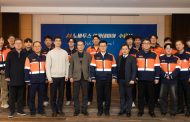On May 20, UNIST and Ulsan Metropolitan City held the vision proclamation ceremony for the Ulsan-Ulju Strong Small R&D Special Zone.
The ceremony has been attended by UNIST President Yong Hoon Lee, Hong-taek Yong (1st Vice Minister of Ministry of Science, ICT), Mayor Cheol-ho Song of Ulsan Metropolitan City, Chairman ByeongSam Kang of Korea Innovation Foundation, Ulju County Governor Sunho Lee, as well as other members of National Assembly and Ulsan Metropolitan Council.
The event proceeded in an order of a follow-up progress report, a vision statement, the signboard delivery ceremony for three INNOPOLIS research institute spin-off companies, a business partnership agreement to create consultative bodies for fostering Ulsan-Ulju Strong Small R&D Special Zone, as well as the vision proclamation ceremony.
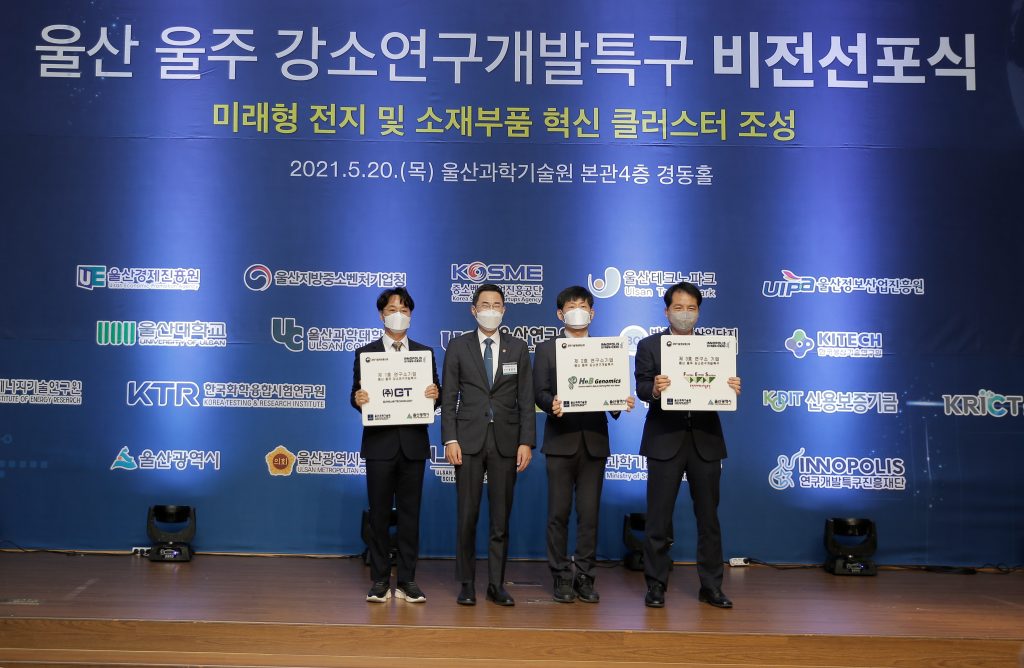
Three INNOPOLIS research institute spin-off companies were given signboards at the official signboard delivery ceremony. From left are Professor Guntae Kim (GT Co., Ltd.), Hong-taek Yong (1st Vice Minister of MSIT), Professor Jeonghan Hong (HnB Genomics Inc.), and Distinguished Professor Sang Il Seok (Frontier Energy Solution Co. Ltd.)
On this day, the Ulsan-Ulju Strong Small R&D Special Zone (hereinafter referred to as Ulsan R&D Special Zone) proclaimed its vision to establish a future battery, materials, and parts innovation cluster, which can contribute to fostering a virtuous cycle that is to create more outstanding technologies that have a significant impact on society, in turn, accelerate technology commercialization, and generate more startups. In addition to this, they announced that this will contribute to the development of the local economic fabric by creating more jobs, and realizing the development and commercialization of the next-generation battery technologies, linking open innovation platforms.
The three INNOPOLIS research institute spin-off companies that received signboards at the official signboard delivery ceremony were GT Co., Ltd., HnB Genomics Inc., and Frontier Energy Solution Co. Ltd. These companies are UNIST-based faculty startups, founded by Professor Guntae Kim, Professor Jeonghan Hong, and Distinguished Professor Sang Il Seok, respectively.
A total of 18 organizations participated in the business partnership agreement to create consultative bodies for fostering Ulsan R&D Special Zone, including Ulsan Metropolitan City, UNIST, Ulsan Economic Promotion Agency, Ulsan Regional Office of SMEs and Startups, Ulsan Techno Park, Ulsan ICT Promotion Agency, University of Ulsan, Ulsan Research Institute, Korea Institute of Energy Research (KIER) ,Korea Research Institute of Chemical Technology (KRICT), Mirae Asset Securities, Korea Technology Finance Corporation (KIBO), and Korea Credit Guarantee Fund (KODIT).
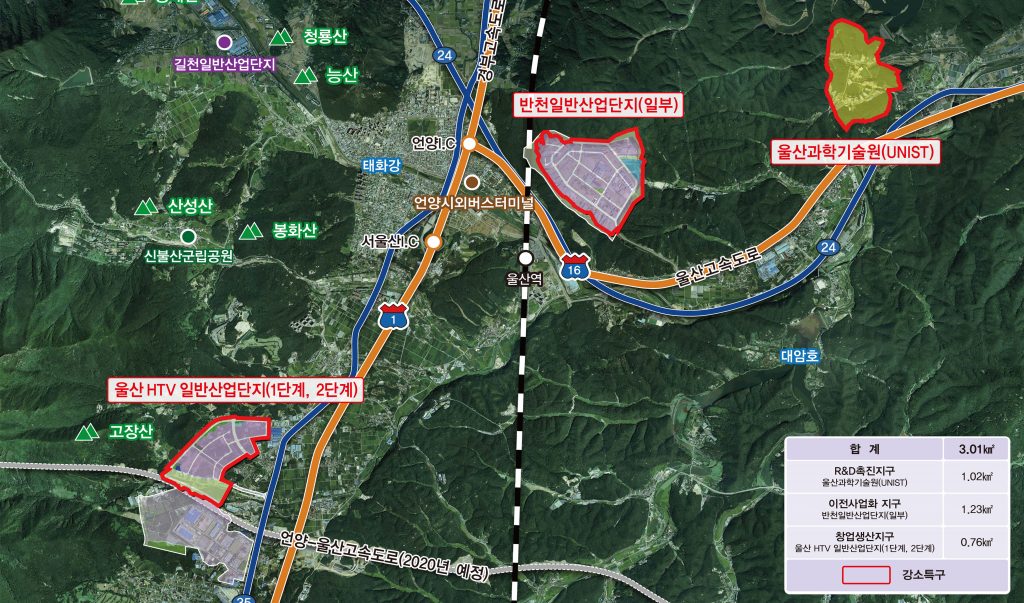
The Map of Ulsan Ulju Strong Small R&D Special Zone Promotion Project. l Image Credit: Technology Commercialization Team
The following three have been newly selected for the Ulsan R&D Special Zone in July 2020: △ UNIST (R&D promotion), △ Ulsan Bancheon General Industrial Complex (Partial/Technology Transfer Commercialization), and △ Ulsan High Tech Valley General Industrial Complex (Partial/Start-up Production).
Accordingly, the Ulsan R&D Special Zone has selected ‘UNIST’ as the core technology institute and ‘Future batteries,’ as its specialized field, and thus has invested 7.2 billion won in total expenditures to foster R&D special zones in related fields.
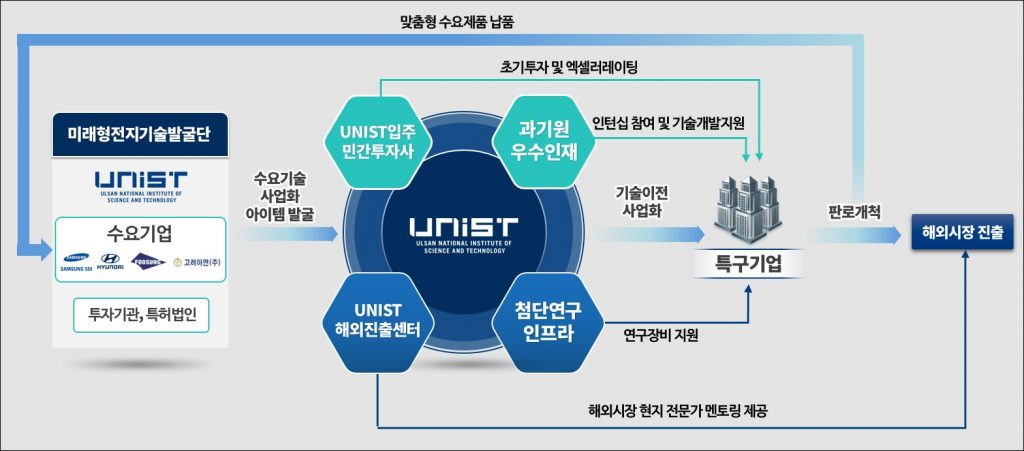
The Diagram of Ulsan Ulju Strongg Small R&D Special Zone Promotion Project. l Image Credit: Technology Commercialization Team
Centered on UNIST, the Ulsan R&D Special Zone aims to develop advanced materials, components, and technologies that enable the creation of the sustainable batteries of the future, such as high-performance secondary batteries, hydrogen fuel cells, and solar cells. It will also focus on developing smart and lightweight composite materials and components for future batteries with the aim of improving cell efficiency. In addition to this, it plans to establish an innovative ecosystem for future battery industries, in connection with the local conglomerates, such as Samsung SDI Co., Ltd., and private investment companies.


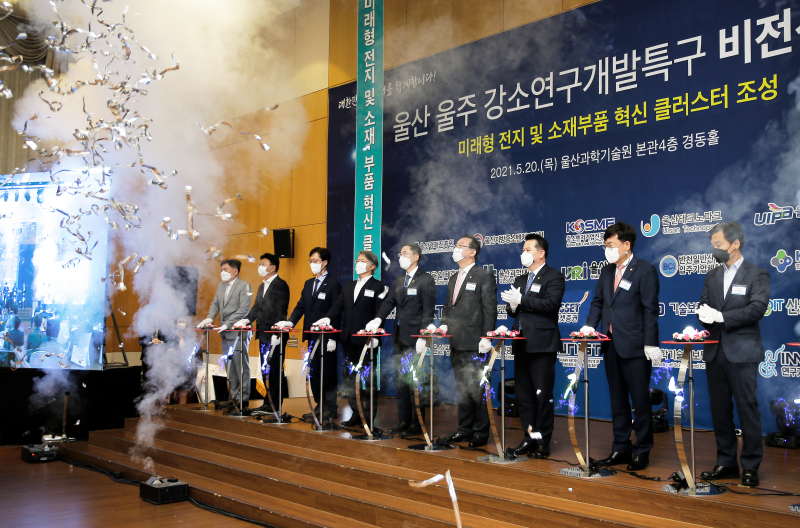







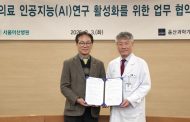
![[2026 Matriculation] UNIST Welcomes Class of 2030!](https://news.unist.ac.kr/wp-content/uploads/2026/02/사진-박종래-UNIST-총장이-2026년-입학식사를-전하고-있다-2-190x122.jpg)
![[2026 UNIST Commencement] UNIST Confers Degrees to 883 Graduates](https://news.unist.ac.kr/wp-content/uploads/2026/02/사진-2026학년도-UNIST-졸업생들이-학사모를-위로-던지며-졸업을-축하하고-있다-1-800x413-190x122.jpg)
